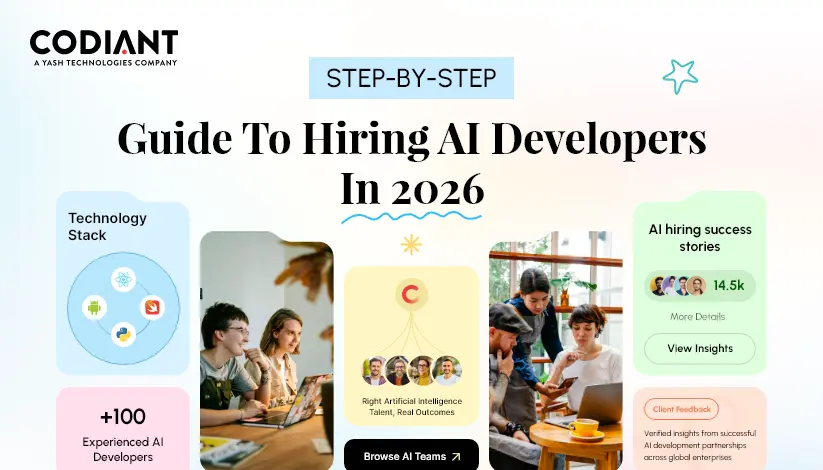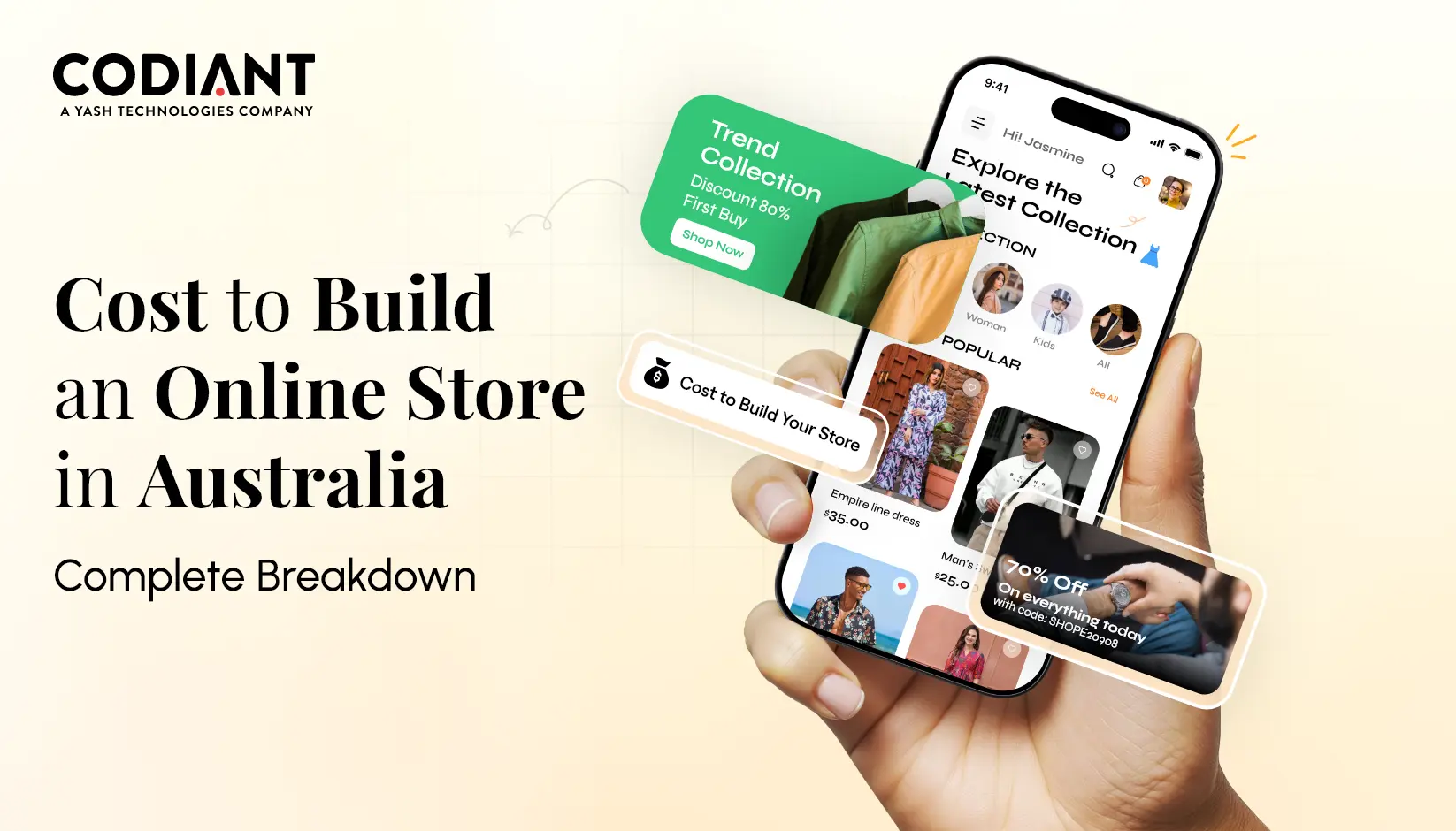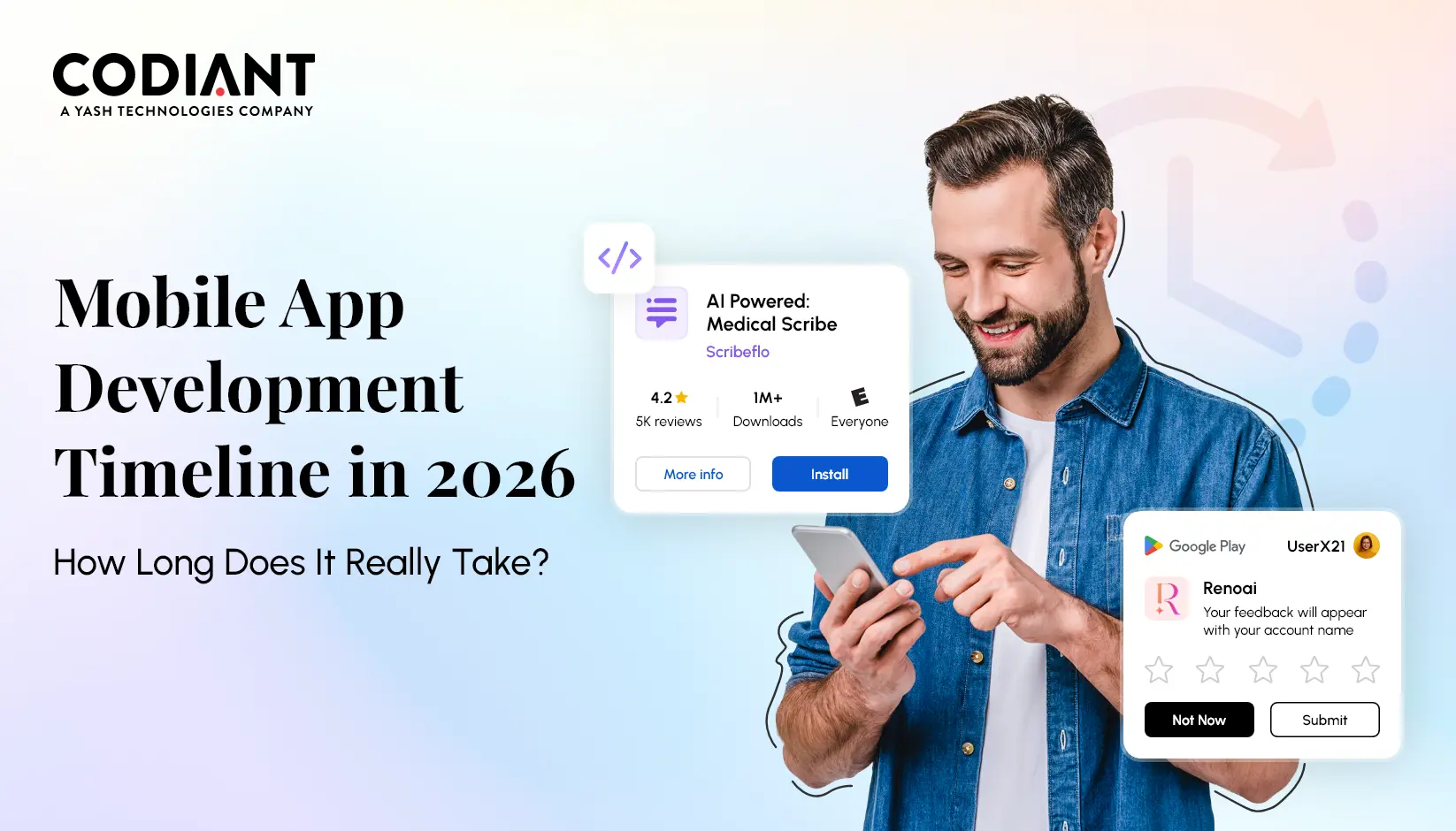Choosing the Right AI Agent Development Company: A Guide for Businesses
Table of Contents
Subscribe To Our Newsletter
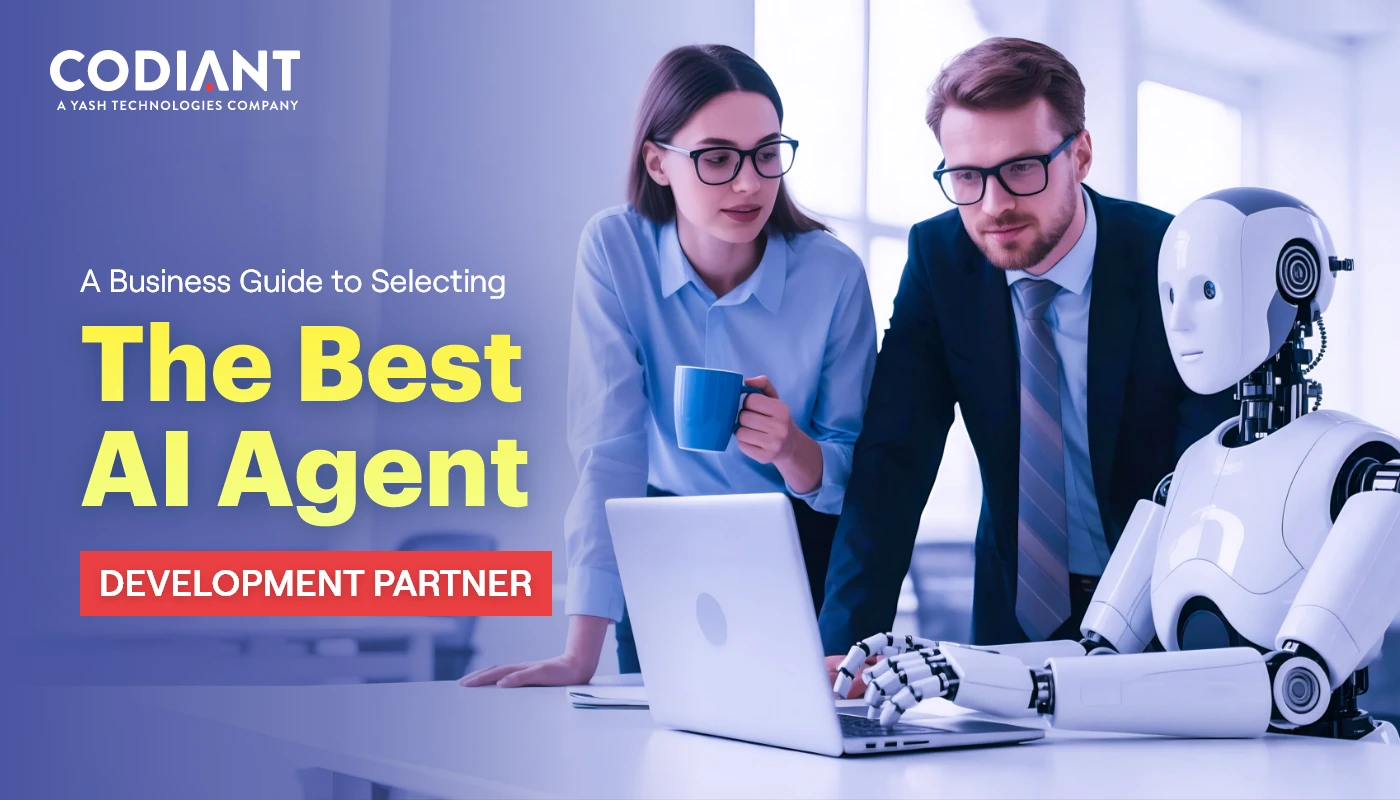
Every business today is exploring AI agents. Some succeed, some fail. The difference? The partner they choose to build it.
A poorly designed AI virtual agent doesn’t just fail – it frustrates customers and damages trust. The right one, built by an experienced company, becomes a digital team member who works 24/7, handles queries, and improves with every interaction.
Think about it-whether it’s a bank answering customer questions at midnight, a hospital triaging patient queries instantly, or a retailer handling holiday rush without burning out staff-intelligent virtual agents are already at work. The bigger question isn’t if companies should adopt them, but with whom.
Choosing the right partner is tricky. The market is flooded: boutique AI startups, traditional IT vendors who now claim AI expertise & global consulting firms offering everything end-to-end. Each promises innovation, speed & scale. But not every AI virtual agent they build can live up to the promise once deployed in the real world.
This piece is meant to cut through the noise. It’s a practical guide to hiring an AI agent development firm, written for decision-makers-CIOs, CTOs, COOs-who need to figure out how to select an AI agent development service that actually aligns with business needs, delivers ROI & scales without breaking.
Why Businesses Are Betting on AI Agents
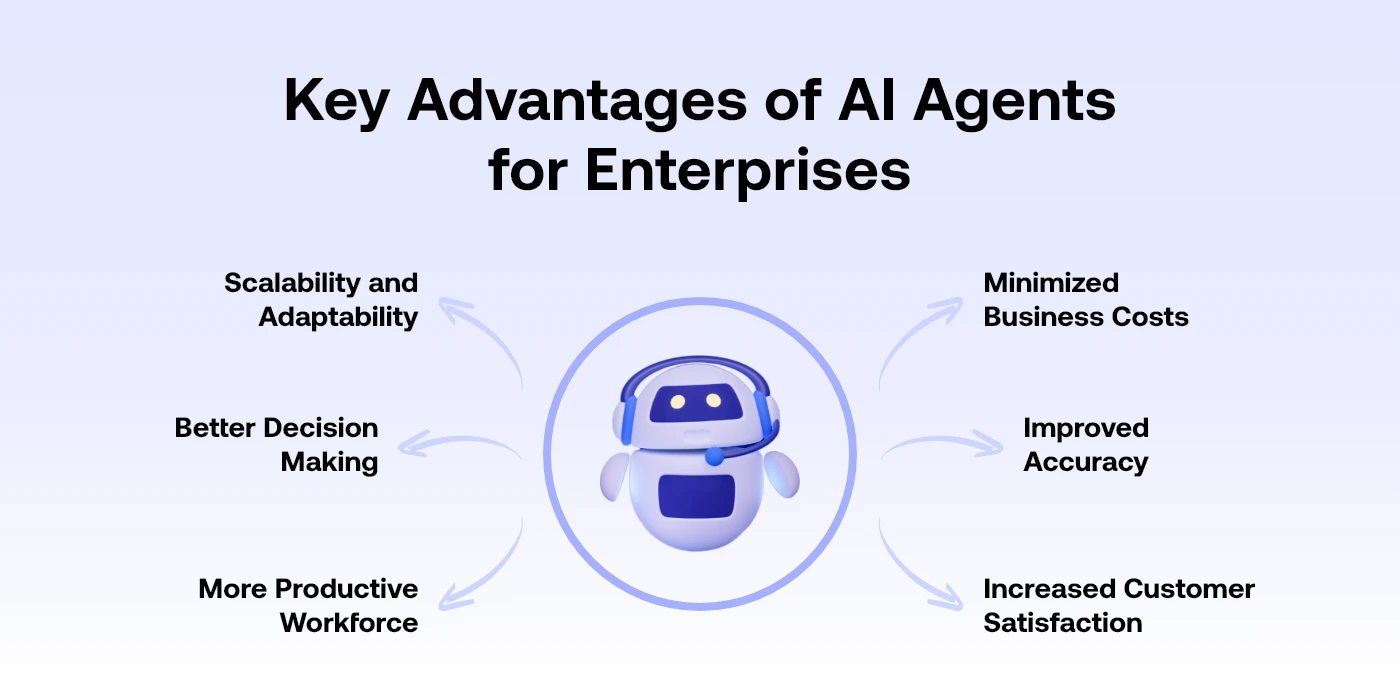
Changing expectations
Customers don’t want to wait. They want quick answers, personalized help & 24/7 access. A traditional support team, no matter how well-trained, struggles to keep up with that level of demand. An AI-powered virtual agent doesn’t tire, doesn’t call in sick &-if designed right-gets smarter with every interaction.
Beyond customer service
Customer service is just the visible starting point. Behind the scenes, AI agents are reshaping how organizations function:
- Finance: running reconciliations, flagging unusual transactions & even advising on risk.
- Healthcare: acting as digital assistants for nurses and doctors, reducing paperwork & helping patients book or reschedule appointments.
- Manufacturing: monitoring machine data, predicting breakdowns & automating supplier communication.
The impact is clear: it’s not only about saving costs. It’s about creating consistent, scalable operations that allow human talent to focus on higher-value work.
Did you know?
By 2030, AI agents are expected to handle nearly 80 % of customer interactions – so if you’re not thinking about this now, you’re already behind.
Read More: How to Build AI Agents That Can Speed Up Your Work and Reduce Other Expenses
The Types of AI Agents You’ll Encounter
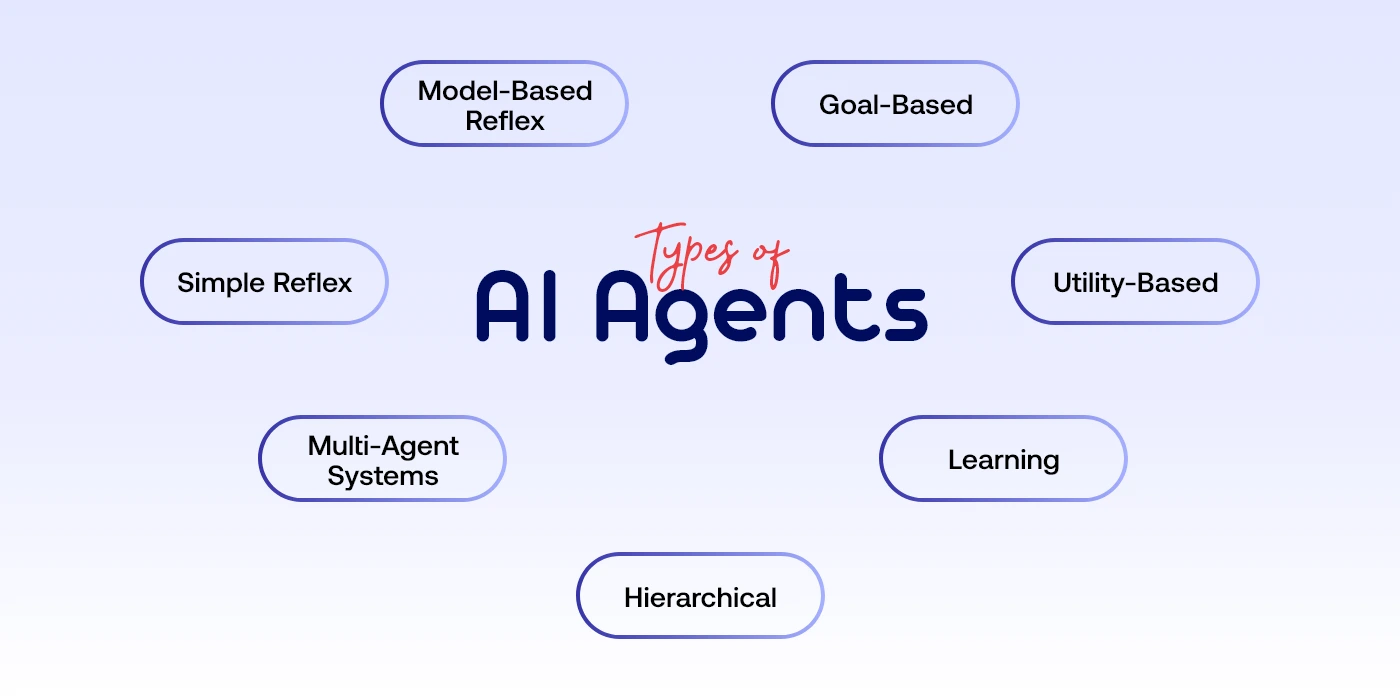
Not all intelligent virtual agents are the same. When you look at vendors, you’ll usually find three levels:
- Rule-based agents – Scripted bots that follow a set decision tree. Fine for FAQs, but they break down once questions get complex.
- Learning agents – Powered by machine learning technology and natural language processing. They get better over time, handle nuance & work across multiple channels.
- Enterprise-grade AI-powered virtual agents – These don’t just answer questions. They integrate with your CRM, ERP & analytics platforms, pull real-time data & in some cases, take autonomous actions like reordering stock or flagging compliance risks.
Knowing which category you actually need is half the battle before even evaluating AI agent development companies.
Want to identify which AI agent your business truly needs?
Don’t jump into vendor talks blindly – first, match the right type of AI-powered virtual agent with your business goals.
Where Deployments Go Wrong?
Before talking about how to choose the right partner, it’s worth acknowledging why many AI virtual agent projects fail.
- Scalability issues: What worked in a pilot with 100 users fails when rolled out to 10,000 customers.
- Data and compliance risks: Agents that can’t handle sensitive data securely are a lawsuit waiting to happen.
- Integration headaches: Plugging into legacy systems-often more fragile than leaders realize-can stall projects for months.
- Change management gaps: Even the smartest AI agent won’t succeed if employees don’t know how to use it or customers don’t trust it.
These challenges don’t mean AI isn’t ready. They simply mean the choice of development partner is critical.
Read more: AI Voice Bots in 2025: A Complete Guide & How to Use Them
A Framework for Evaluating AI Agent Development Companies
Here’s the practical part. When businesses ask, how to select an AI agent development service?-this is the lens Deloitte and similar advisory firms encourage:
Strategic fit
Does the company understand your sector? Are they speaking your language in terms of KPIs-reducing claims handling time, increasing sales conversion, cutting support costs? Or are they selling generic “chatbot” solutions?
Technical depth
Check their fluency with NLP frameworks, LLMs & multimodal AI. Do they mention specific technologies-LangChain, Rasa, GPT models, Azure Cognitive Services-or just vague AI talk?
Security and compliance
Do they have experience in regulated industries? Are they ISO-certified or HIPAA/GDPR compliant? A good AI-powered virtual agent company should talk about security unprompted.
Delivery model
How do they build? Agile sprints with frequent demos? DevOps pipelines for continuous updates? Do they provide ongoing support after launch-or just hand over code and disappear?
Ecosystem and innovation
The best firms aren’t isolated. They have partnerships with cloud providers, academic labs & other startups. That ecosystem ensures your agent won’t be outdated in 12 months.
Steps to Selecting the Right Partner
A guide to hiring an AI agent development firm isn’t complete without a step-by-step approach. Here’s a sequence that works:
- Define the use case. Be specific. Is the agent handling HR onboarding, customer claims, or field service support? Tie it to measurable goals.
- Shortlist providers. Analyst reports, case studies & peer networks help narrow the list. Look for proven domain expertise.
- Run demos and pilots. Don’t take glossy decks at face value. Test how their AI virtual agent actually handles real data and edge cases.
- Evaluate governance. How do they handle bias? How do they monitor model drift? What’s their escalation plan if something goes wrong?
- Think partnership, not project. Avoid vendors who just want to sell software. The right partner evolves the solution with you over years, not months.
Industry Lessons: Case Studies
Sometimes numbers tell the story better.
Retail: A global retailer used AI-powered virtual agents during holiday surges. Resolution times dropped 40%, saving $10M annually.
Healthcare: A provider rolled out an intelligent virtual agent for triage and scheduling. Patient wait times fell 30%, clinician efficiency rose 20%.
Banking: An institution deployed AI agents for fraud monitoring. Alerts became 50% more accurate, preventing millions in losses.
These examples show why more leaders are pushing to get this right the first time.
Read More: Not All AI Agents Are the Same… So Which GenAI Solution Truly Fits Your Needs?
What to Ask in Vendor Conversations?
When engaging firms, move past the marketing speak. Ask:
- Can you show me a deployment in my industry?
- How much of your solution is custom-built vs. standardized?
- What’s the full cost of ownership-including licenses, integrations, training, maintenance?
- How do you measure success after go-live?
- Who are your reference clients & can I speak with them?
These questions separate real expertise from sales pitches.
Risks of Choosing the Wrong Partner
Choosing poorly has consequences:
- Frustrated customers: A clunky AI virtual agent can harm your brand faster than it helps.
- Hidden costs: Integration issues or retraining models can balloon budgets.
- Compliance nightmares: Mishandled sensitive data can trigger fines and lawsuits.
It’s not about fear-it’s about due diligence.
Read More: How a Voice AI Agent Can Help You Get More Appointments and Leads
The Human Touch in AI
Here’s the irony: the more advanced AI agents become, the more we crave human-like warmth.
We’ve all been there – trying to get help from a bot that keeps misunderstanding us until we finally say, “I just want to talk to a human.” That frustration is exactly what the right AI development company works to avoid.
The best partners know technology alone isn’t enough. It’s about balancing efficiency with empathy. Because at the end of the day, customers don’t remember the algorithm. They remember how it made them feel.
In Summary
Picking an AI development company is no longer a technology decision-it’s a business decision. The right AI-powered virtual agent partner helps you reimagine operations, build resilience & stay relevant as industries shift. The wrong one? It leaves you with sunk costs, frustrated teams & missed opportunities.
So if you’re asking yourself how to select an AI agent development service, keep the focus sharp:
- Does the partner align with your goals?
- Can they scale with your ambitions?
- Do they innovate enough to keep you ahead?
This guide to hiring an AI agent development firm doesn’t give you a single “best” answer-because every industry and business is different. But it does give you the lens to evaluate. The rest is about doing the hard work of asking the right questions, running the right pilots & building the right partnerships.
At the end of the day, the real choice isn’t just about technology-it’s about who you trust to help write the next chapter of your business.
Will Your Next Move Be Smart Enough to Outpace Change?
Partner with experts in AI agents to transform ambition into measurable business outcomes.
Frequently Asked Questions
Beyond cost savings track metrics like reduced average handle time higher first-contact resolution & improved CSAT (customer satisfaction). For some companies the bigger ROI comes from improved retention-customers stay longer when service feels effortless.
They chase the demo, not the delivery. A flashy prototype might look smart, but if it doesn’t integrate with your CRM or workflows it fails in the real world.
Timelines vary. A simple FAQ bot? Weeks. But a fully integrated AI-powered virtual agent with workflows, compliance, and analytics? You’re looking at 3–6 months for a meaningful launch. Any vendor promising “done in 10 days” is overselling.
No-and that’s the point. They handle repetitive, high-volume queries so your human agents can focus on complex, emotional or high-value interactions. Think of it as creating space for your people to do the work that really matters.
Budgets swing widely-$30K for a pilot, $150K+ for enterprise-scale deployments. The real cost factor isn’t development, but ongoing training, compliance & data management. A transparent partner will walk you through these upfront instead of springing surprises later.
Featured Blogs
Read our thoughts and insights on the latest tech and business trends
How to Hire AI Developers for Automation & Smart Applications- A Complete Guide for 2026
- January 29, 2026
- Staff Augmentation
In a Nutshell AI hiring in 2026 is a business decision, not just a technical one. Most AI failures happen due to wrong hiring models and unclear scope, not bad ideas. Successful automation starts by... Read more
How Much Does It Cost to Build an eCommerce Platform in Australia?
- January 27, 2026
- E-commerce
In a Nutshell eCommerce development costs in Australia typically start from AUD $10,000–$25,000 for basic stores, while advanced or enterprise platforms can range from AUD $80,000 to $250,000+ depending on complexity. Shopify offers a lower... Read more
How Long Does It Take to Develop an App in 2026?
- January 21, 2026
- Mobile App Development
In a Nutshell App development timelines depend more on scope clarity than technology speed. Simple apps take 2–4 months; complex platforms often require 9–12+ months. MVPs typically launch within 6–16 weeks when features remain tightly... Read more

